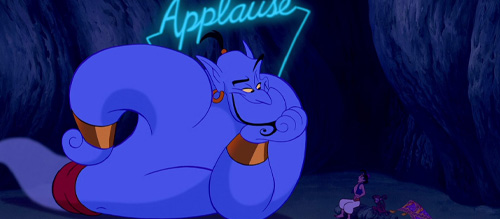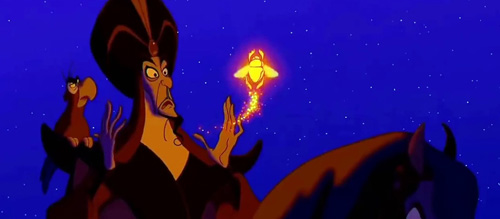‘Aladdin’ at 30 – Review

Aladdin (1992)
Directors: John Musker, Ron Clements
Screenwriters: John Musker, Ron Clements, Ted Elliott, Terry Rossio
Starring: Scott Weinger, Robin Williams, Linda Larkin, Jonathan Freeman, Frank Welker, Gilbert Gottfried, Douglas Seale, Jim Cummings
After they successfully revitalised Disney’s animation department with The Little Mermaid in 1989, directing team John Musker and Ron Clements turned their attention to a new musical inspired by ‘One Thousand and One Nights’, a collection of Middle Eastern folk tales compiled over centuries and first printed in Arabic in the 18th century. Given the title Aladdin after a later story addition to what became known in English as ‘Arabian Nights’, and built largely around a showstopping vocal turn from Robin Williams, the film became a firm favourite among Disney’s 1990s “Renaissance” output and 30 years later still offers much to enjoy.
We follow the titular orphaned “street rat” (Scott Weinger) stealing to survive on the streets of Agrabah until the day he falls for the Princess Jasmine (Linda Larkin) who is running from her impending royal marriage obligations. After being jailed by the Sultan’s guards, Aladdin is offered his freedom and the chance to claim untold riches when the scheming royal vizier Jafar (Jonathan Freeman) recruits him to retrieve a magic lamp from the mysterious Cave of Wonders, freeing a wish-granting Genie (Robin Williams) in the process.
Much like the wizard Merlin from 1963’s The Sword in the Stone, because he’s a magical being the Genie is not tied to the time and place in which he currently finds himself. Because of this, Robin Williams could improv and anachronistically reference contemporary popular culture to his heart’s content and hope the Genie’s animators could keep up with at least some of it. This is one of the first examples where the animation was largely completed after, and to match, an actor’s vocal performance and body language; a much more common practice today with recognisable film and TV actors lending their voices to animated characters rather than making use of chameleonic career voice actors.
Rapid-fire impressions to be found among Williams’ relentless stream of consciousness include Arnold Schwarzenegger, Jack Nicholson, Robert DeNiro, Arsenio Hall and Peter Lorre, but as always with his stand-up routines you can still pick up a joke you missed on every re-watch.
Williams also had a decent set of singing pipes on him and so each of the musical numbers sung by the Genie (the two no holds barred extravaganzas “Friend Like Me” and “Prince Ali”) are far more memorable and purely enjoyable than all the rest. Incredibly it was “A Whole New World” that won Best Original Song at the 1993 Oscars and not “Friend Like Me” (both were nominated) despite the former immediately making you think of bad karaoke duets. Alan Menken and Howard Ashman were a dream musical team for Disney right up to Ashman’s death during production, his lyricist duties taken over by Tim Rice and sadly losing some sharp wit along the way.

The rest of the vocal talent are consistently good, together with their talented animators all adding colour and extra layers to their broad characters. Freeman as Jafar particularly delights in his despicable pantomime performance as one of Disney’s great love-to-hate villains who goes from a subtle schemer to a far more physical threat as the story progresses and Jafar’s powers as a sorcerer rapidly increase. He’s paired well with Gilbert Gottfried as his irritable parrot sidekick/foil Iago, their plotting and squabbling providing some of the film’s biggest laughs. You’ve got to tip your hat to the endlessly versatile Frank Welker too, who voiced Raja the tiger, Abu the monkey and Abu the monkey-as-an-elephant.
Aladdin himself makes for a likeable protagonist on the go-to journey of Disney heroes in the 1990s, discovering the value of being yourself. His tough life on the streets makes it understandable why he’d see the wealth and status of his new alter ego Prince Ali as the secret to happiness, but it’s disappointing that the writers didn’t give Jasmine more credit to see right through him given that she witnesses first-hand how at home he is on the streets during her jaunt outside the confines of the palace. While the Princess is not the most active driver of action here, at least her arc didn’t feel as forced as the over-corrective efforts made in the 2019 Aladdin remake.
Like any Disney film made decades ago and set in another culture, any kind of deep analysis simply can’t ignore the at best lazy, at worst outright racist stereotypes on show. Williams voicing the fast-talking, shady peddler at the beginning is bad enough, but there’s plenty of orientalist othering and gross generalisations about Arab and Muslim cultures going on throughout the film as well, as beautifully as this world is admittedly realised in animation.
Considering he’s so much a part of what makes the film a success, it also leaves a bad taste in the mouth that Williams had an integrity that Disney tried to exploit through merchandising, which he took rather personally. He therefore only voiced this iconic character twice in his many multimedia appearances, the other time being in the second direct-to-video sequel, King of Thieves.
For all its dazzling animation and fun knockabout tone, Aladdin is a film truly made by the earnest friendship at its heart. Genie and Al are thrown together by circumstance, and both have their own dreams and hurdles to overcome. At first, the Genie is a means to an end, a magic-my-life-better solution for Aladdin, but their relationship quickly grows into a bromance, the Genie taken pleasantly by surprise by when he is summoned not by another uncaring master but a decent guy who asks him what he really wants after millennia. You love and care for all these characters, plus there’s no shortage of animated movie magic to help you forgive the film’s shortcomings.
Score: 17/24
Recommended for you: Disney Renaissance Movies Ranked

